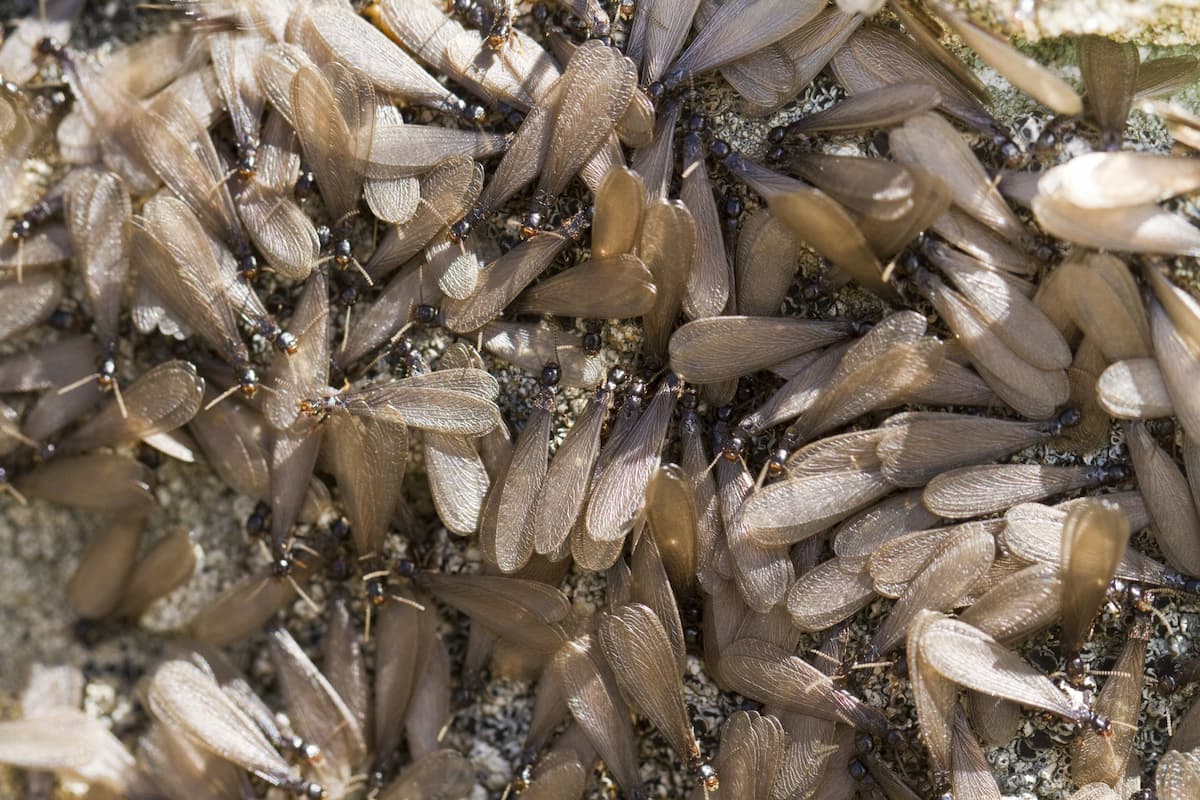How Often Should You Tent For Termites In Florida?
Tenting is the most effective method for exterminating termites.
With the hot, wet Florida climate providing the best conditions for these insects, it’s no surprise that the state ranks high for termite infestations.
Tented houses are not strange to most Floridians, but is regular tenting the solution to recurring infestations?
The effects of termite tenting last from five to thirteen years (on average). In Florida, even where termites are rampant, after you’ve tented your home, you likely won’t have to repeat the process for several years if you keep up with regular inspections and routine maintenance.
Because tenting is a control method used to eliminate large infestations, regular inspections and routine maintenance help keep termite colonies at bay before they become a cause for concern.
When is Termite Season in Florida?

Termite season is every season in Florida, unfortunately. Florida is hot and humid most of the year, and termites thrive in these conditions.
This ideal environment makes Florida home to most termite types, including the big three: drywood, subterranean, and dampwood.
You’re more likely to see them swarm during the spring, though it’s just as common to see them in the summer months.
Is Regular Termite Tenting a Solution?
Tenting is the solution to an extensive infestation, but it doesn’t protect you against future colonies. Regular inspections are a cheaper, more effective way of keeping termites away after you’ve had your house tented.
When you tent a house for termites, the exterminators use one of two methods: heating and fumigation.
The former involves raising the temperature of the wood inside your home so the termites find it unbearable and die. The latter is about spraying chemicals into a tented house and depleting the insects’ oxygen supply.
Both immediately affect existing colonies but don’t do much as a prevention method (without the presence of termites, you’re just making your wood hotter and spraying chemicals into your house for no reason).
The effects of fumigation last for at least five years, but without additional precautions, like inspections and preventative maintenance, you’re not entirely termite-proof.
Once you hire an exterminator, they will inform you about areas of your home at risk and identify points for potential invasions before they get out of hand.
Most professionals recommend annual inspections, but you can conduct them at closer intervals if you’ve had an infestation and are concerned about potential recolonization.
The Cost of a Termite Inspection in Florida

Termite inspections in Florida cost between $75 and $150. A termite clearance letter or official report adds an extra $100 to $200 to the final bill.
Specific companies offer free inspections but require you to sign a treatment contract.
Most termite inspections take no more than two hours. During a review, the inspector looks for signs of an infestation in the interior and exterior of your house. They carry gadgets that make their work easier and recommend ways to keep your home termite-free.
On the other hand, termite tenting takes three days to a week, depending on house size, chemical concentrations, and weather (humid weather equals a longer process).
It’s usually more economical to keep up with regular inspections and preventative maintenance than to deal with a full-blown infestation.
The Cost of Termite Tenting in Florida
Tenting is the most expensive termite control method, and the cost of tenting in Florida is even higher than in other places.
The final bill largely depends on the size of your house and the extensiveness of the infestation. Expect to pay, on average, $1.10 to $4 per square foot (0.09 sqm).
The total price can run anywhere from $1,000 to upwards of $12,000 – a pretty wide range – but the average tenting cost is usually less than $3000 or $4000 for a 1000 sq. ft. (93 sqm) house.
Depending on the extent of the termite damage, you may have to factor in repair costs, which can increase the budget to upwards of $5000.
Comparing these numbers to an annual inspection shows that prevention is usually better than control when it comes to termite infestations.
Signs of Termites in Florida

Understanding the signs of termites is key when you live in Florida. Taking the initiative to check your home allows you to act on the situation as soon as possible.
Common signs of an infestation include discarded wings, mud tubes, peeling paint, and holes in drywall.
Frass (termite feces) is also a key indicator. The excretion resembles wood shavings and shows that you’re hosting drywood termites.
You likely have a vast colony if their droppings are out in the open, as drywood termites tend to stay out of sight and are the hardest to detect.
Aside from physical signs, you can also listen for a crunching sound in your walls. Hearing it means the insects are feasting on your wood, and you should do something about it ASAP.
Preventing Termites in Florida
Tenting is never a lasting solution – the little things you do daily have a better chance of keeping you termite-free than one mass extermination.
If you need fumigation, ensure the exterminator sets up barriers to avoid re-entry. They should also treat your wood and do anything else you can’t to ensure you’re as termite-proof as possible.
The following precautions are also recommended:
- Reduce the amount of moisture in and around your house. If the exterior of your home is prone to still water, dry or remove it as soon as possible.
- Store wood in a secluded place. It should be a few feet away from your house and not have any buildings surrounding it. If you can, also elevate it off the ground.
- Carry out regular inspections of wooden structures for signs of damage. House areas where wood is prevalent include your patio and attic, but you should also inspect your furniture and doors.
- Dispose of decaying trees, leaves, and branches in your yard. Termites are decomposers, and doing nothing about decomposing vegetation gives them an additional food source.
- Repair your home to prevent entry. Seal wall cracks and repaint the areas if the initial coat peels.
Implementing these measures alongside annual inspections ensures you stay termite-free for a longer period of time.
Termite Insurance and Bonds in Florida

Homeowner’s insurance in Florida does not cover termite infestations – some policies even say so in the fine print.
Termite infestations happen over time and don’t catch people by surprise. The avoidable nature of an infestation discounts it as an emergency, explaining why homeowners sometimes turn to termite bonds.
These resemble insurance, whereby you pay an annual fee and submit a claim when facing an infestation.
However, termite bonds are not as reliable as an insurance policy, and it’s common to see complaints about miscommunication and low-quality service compared to what they paid throughout the years.
The State of Florida and the Better Business Bureau receive numerous complaints annually, so do your due diligence before signing up for a termite bond.
Conclusion
Termite prevention involves many aspects, especially in termite-prone areas like Florida. Unfortunately, tenting is an excellent solution to an infestation but a poor method for prevention.
To maintain your termite-free status after tenting, you must do your part to ensure you don’t have the same experience the following year.
Simple activities like cleaning your yard and proper wood storage significantly reduce your vulnerability to termites.
Implementing preventative measures, in combination with regular inspections, ensures the exterminator doesn’t become a frequent visitor to your home.
